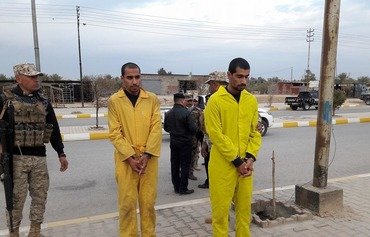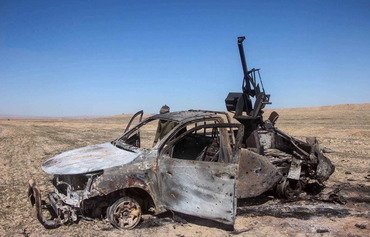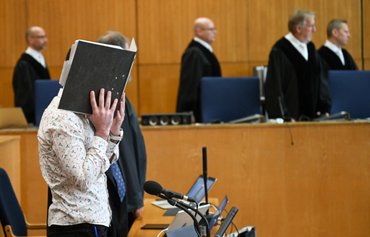A full year after he was arrested in Anbar's desert in an Iraqi operation with air cover from the coalition, "Islamic State of Iraq and Syria" (ISIS) suspect Talib Jasim Fayyad has yet to receive visits from any of his family members.
He says he does not even expect them to.
"My wife and children do not want anyone to know I am related to them, and have changed their place of residence because of this."
"None of them has visited me and they do not ask about me," he told Diyaruna.
Fayyad, also known as Abu Taha, is currently being held pending investigations into the crimes he committed for the sake of ISIS between 2014 and 2018 in Anbar and south of Baghdad.
He is expected to receive a life sentence after confessing to taking part in the fight against Iraqi forces that resulted in the death of security personnel.
Abu Taha was also involved in confiscating the homes and property of Iraqis that ISIS labeled as kuffar (infidels), deeming the seizure of their assets as permissible.
"There is not much to say," he said. "I was a mindless idiot and I wish time could turn back a few years."
"We were drowning in hatred and rancor that we enveloped in a religious framework," he said. "That is the truth."
"This brought calamities upon many and we did things that neither God nor Islam commanded us to do, but that we falsely attributed to Islam," he said.
"The word shame does not fully express how I feel," Abu Taha said.
Shame, remorse
"Repentance or confessions do not change the reality of what the prisoners had committed, as the law is clear about the punishment meted out to those involved in terror crimes," said Judge Ali Awni al-Abadi of al-Rasafa Investigative Court in Baghdad.
Many of them collapse in the court or during interrogation, and others express remorse and say they wish they could change what happened and turn back time, he told Diyaruna, "and unfortunately most of them are young men".
That is why the punishment handed to those involved in recruitment-related activities is more severe than the punishment handed to recruits, he said.
"ISIS's terrorist attacks caused the death of innocent people and destroyed the lives of tens of thousands of Iraqi families by widowing women and orphaning children, and so every criminal must be punished," said al-Abadi.
"What we see and hear in court from the terrorists is that despite confessing their crimes, they still feel shame and disgrace," he said.
'Message to future generations'
The media should disseminate the confessions of detained ISIS elements and their expressions of remorse and contrition for their actions, said MP Mohammed Rida, who chairs the parliamentary security and defense committee.
"We see these confessions as messages addressed to future [generations] that undermine every terrorist project rooted in hate, killing, blood and revenge," he told Diyaruna.
These confessions can show that "the rhetoric of ISIS, al-Qaeda and any other extremist group is that of deceptive foxes, which has been exposed for the nonsense that it is", he said.
ISIS's recruitment and revenue machine has almost completely come to a halt, with some elements disavowing the group and fleeing its ranks, said analyst Fouad Ali, who specialises in extremist groups.
"This can also be observed on social networking platforms, where some accounts that supported the group or saw the group's ideas as being similar to theirs, have retracted their positions and now criticize, assail and mock ISIS," he told Diyaruna.
They accuse it of bringing calamity upon Iraqi Sunnis, and of killing untold numbers of Sunnis in Iraq and Syria under false and fraudulent pretexts, he said.

![A picture taken on October 27th shows Mosul's heavily damaged al-Nuri Mosque in the former ISIS stronghold in northern Iraq, where the group's late leader Abu Bakr al-Baghdadi used to address followers before the group was chased out of the area in 2017. [Zaid al-Obeidi/ AFP]](/cnmi_am/images/2019/12/20/21561-Iraq-Mosul-Nuri-600_384.jpg)






